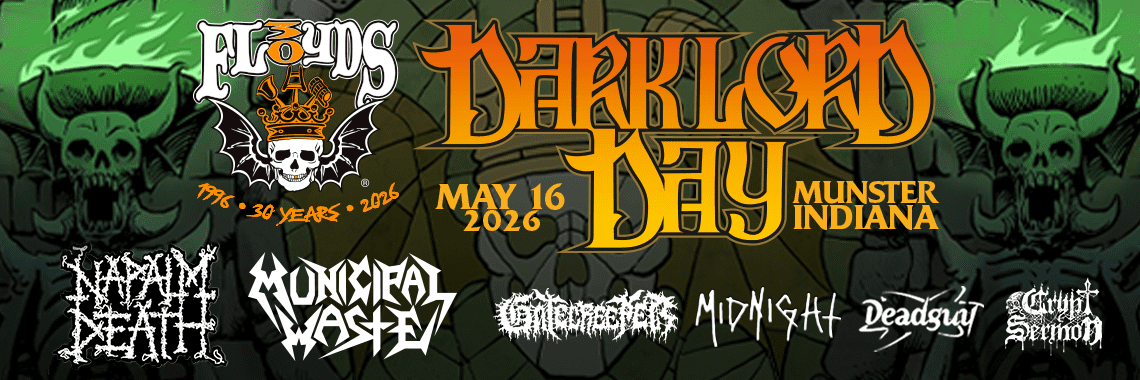
“Since the demons aren’t summoned anymore, they are coming by themselves.”
— MÜLLER-STERNBERG
When the last table in the restaurant glances up from their reverie or argument or negotiation or what-have-you and realizes that they’re indeed the hindmost guests dallying in the dining room, they tend to shift a tad uncomfortably in their seats, make a quip about how they always seem to ‘close the joint down’ and finally peel their dress jackets and purses from the backs of their chairs. As I hold the door for them on their way out, they will, without fail, apologize for keeping me and mine so late and as I shake their hands, I’ll—in essence—always reply in the same way: Think nothing of it, friend. You can’t have a first guest of the evening without having a last. It’s a nonnegotiable sequence.
There is no back without a front. Simple enough. This is partially why I can appreciate and really dig into the antipodes of my own spiritual viewpoints voiced by the music that I listen to. It’s a convenient philosophical ballast. The negative image affords us a tool to hone our ideologies upon.
I’m hardly the first to note that through the decades, as metal has shaken its spiky cuffed fists at orthodox Christianity, it’s ultimately become further and further enmeshed within the object of its bile so that at this point, its extrication’s completely impossible. As Gore Vidal said regarding the U.S. and the Soviet Union’s hazardous rivalry, both factions desperately require one another for the point of focus they provide.
In fact, can you even imagine heavy metal completely and entirely cleansed of the looming specter of the Christian god? What sort of stories would we tell ourselves then? What would our aesthetic even look like? But the exercise of considering this parallel experience is a worthy one. It’s important to remember that the authoritarian, sexist, parsimonious iteration of Christian doxology that so many of us love to hate was once just one of myriad potential shoots stemming from a central root. It could’ve taken many other forms. There was an equally good chance that the proverbial ball would have been wrestled away from the likes of apostles Paul, (a total asshole by the way,) and Peter by several others, including Simon Magus, ‘The Standing One,’ a man, who even his detractors ruefully admitted was endowed with impressive magical abilities including levitation and the ability to animate the dead. The precious few surviving words of Magus echo the holistic mysticism encapsulated in Hermeticism and the Kabbalah, whittling the concept of what Christianity could have been into novel, intriguing form. If he’d fully achieved the mantel of Christ, and if that form of Christianity had flourished in the same way, (quite unlikely,) what shape would an outfit like Marduk, Impaled Nazarene or Exhorder then take in that reality? In the vacuum of religious imperialism, what’s the inverse attitude that metal reflects? It’s admittedly pretty difficult to envision.

Let’s keep going. What if the early gnostic sect, the snake extolling Ophians had dominated the narrative? These O.C’s, (Original Christ [contender’s],) seemed to have viewed Jehovah as a lesser deity and attached a great deal of import to serpents, most especially the reptilian tempter from the Garden of Eden who was recognized as a liberator of humankind, offering us the sorely needed knowledge that the Old Testament Lord of Hosts had denied us. What visual standards would metal gravitate towards when snakes are playing for the other team and Christianity actually encourages the pursuit of knowledge as opposed to an insistence on blind faith? What precisely would Kreator preach then? Would they have operated as a Christian metal band in that world, breathing life affirming albums into being such as Wondrous Certainty, Eternal Pleasure and Out of the Dark…Into the Light, (actually, that last one still works…)? There are even assertions—perhaps entirely apocryphal—of one Messianic contender who was proselytizing via a form of friggin’ sex magic. The notion gives the term ‘Sunday Mass’ a whole new meaning, right? [note that I refrained from making the obvious joke about ‘the laying on of glands’ instead of the ‘laying on of hands’ because Fallow Heart doesn’t traffic in such churlish toilet-tomfoolery.]
“When all words are deniable, go and burn your Bible.” —Edge of Sanity
The Christian faith’s edges have also been acutely serrated by simple mistranslation, developing teeth through happenstance that have resulted in remarkable damage to the psyches of millions. For example, in its native Hebrew, the Trinity was visualized as Father, ‘Spirit,’ (the word is feminine in Hebrew,) and Son. There. You’ve got yourself a proper, nuclear family now. But in its translation into Greek, ‘Spirit’ is gender neutral and so the relationship between those three immediately becomes unintelligible, while Latin repurposed the whole concept as entirely masculine, widowing the concept of ‘Father’ and scrubbing the trinity of all vestiges of feminine identity and authorship. So what toll has the refusal to accept women’s congenital, vital role in creation and divinity extracted, not only on Christian adherents but on all of us Westerners? I propose that it’s orphaned us from our paradigmatic mothers and left us the progeny of a single, harried and far too easily vexed dad. No wonder we list towards so much angst; we’ve been preprogrammed with fucking mommy issues. Also, we’re exclusively male but somehow righteously galvanized against gay marriage. Sir, yes Sir! Irrationally fuck everyone, I guess.

Supposing that balance had never been undone and that, in turn we were given a more supportive and far less tribalistic, bloody-minded Father, (one whose children weren’t compelled to constantly make excuses for?) What occurs in the vacancy of a celestial monarchy? Our psyches, our temperaments and thus our artistic expression would be radically altered, right? The band’s we salivate over would snap into a completely different form. Celtic Frost, Aosoth and Morbid Angel are renovated creatures and perhaps even unrecognizable. Voivod might make it through intact, (saints be praised) but black metal as we know it is leveled, ladies and gentlemen. The gnostics in their various guises didn’t preach hell and they didn’t value or in any way pursue any sort of forceable conversion. The concept would have been unthinkable to them. In this world, there are no holy invasions or ill-begotten chapels to ‘inflame’a young Varg Vikernes and so the scene coalesces in a radically different manner. Incidentally, have you taken the time to thank your local pastor for their service, (to metal?) Let There Be Light!

Thantifaxath or, Give Me Some of That Old Time Religion
Now here’s a remarkably nasty specimen who would survive this hypothetical, (well, not unscathed exactly, there’s no band who happens to be scathed down to their marrow more than Thantifaxath,) at least unaltered. These guys owe their grievous acrimony as well as their band name to an arch-demon who minds the inaugural passage in the Qliphoth, the reverse facet of the Kabalistic Tree of Life. The Qliphothic Tree’s a territory in which Yahweh’s light can never penetrate and its ruinously, fantastically negative. Whereas the Tree of Life illustrates the geometric, Pythagorean principles from which the world was built, the Qliphoth operates via a turbulence of fractals and chaotic abandon.
“The devil is composed of God’s ruins,” —Éliphas Lévi
The story of the Tree’s construction is worth relating. It stems from the Divine’s determination to draw creation into being from nothing. The Ain Soph Aur, (which translates as “borderless light of non-creation,” [incidentally guys, this subject matter’s utterly fertile band name territory; have at this shit!]) which represent the Divine’s intention prior to creation, conjures a vacuum within which it can deposit its intention in a sequence of ten emanations; nine representing individual aspects of the Divine with the tenth essentially contracted to coral the others. These were intended to be captured in separate clay vessels, arranged in tiers similar to a tree in order to stimulate their individual processes of ‘becoming,’ (totally makes sense. At least, that’s how I would do it.)
The story thus far may function wonderfully as a ‘how to’ guide for rookie gods but to my uninitiated mind, it’s largely kaleidoscopic gibberish. However, I very much appreciate the concept of divine power devising a way in which to arrest itself in order to properly effect its own will. It wildly recalls Ouroboros and MacGyver in the same friggin’ instance. At any rate, the first four vessels successfully contained their individual emanations, coming to life as autonomous, benevolent entities in the process, but the fifth one could not withstand its light and was shattered. That facet of the Divine was strength, which by dent of its nature can’t be contained, (no, not even by a fucking clay pot.) Through that act of destruction, the conceit of ‘strength’ was reiterated as ‘severity’ and (drumroll!) evil was introduced to the canvass of creation. Additionally, the absence of that fifth vessel gouged a sort of portal leading to the opposite side of the Tree of Life, because again, there can be no back without a front. Even though the remaining vessels were installed and animated in the fashion they were intended, the portal couldn’t be closed once it was opened, offering a narrow thoroughfare to the Tree of Death for the intrepid to spelunk. The Qliphoth is essentially a network of channels connected to stations which broadcast the utter inverse quality of the Divine with which they correspond on the other side of the Tree. Through the demolishing of the fifth vessel, the Tree of Death’s occupants developed an insatiable thirst for destruction, the irony of which is that they rely upon and must use creation in order to satisfy their need for destruction; they’re entirely dependent upon the object of their avarice. One can sense Gore Vidal smiling ruefully within his grave.
And there, at the base of the Tree, looming within his passage is the “Great Ghoul” Thantifaxath, unmoved by any considerations regarding Christ or Christendom and what might have been. This is the real deal, friends. He’s a chilling little bugger, the bastard.
I’ll wrap unceremoniously by admitting that Thantifaxath and the Qliphoth were intended to be the primary subjects of this column. Clearly that proved not to be the case. Though I adore the band and find the derivation of their name fascinating, I discovered that the deeper I delved into the subject, a quietly adamant unease began to slip over me. Why the concept should incite any degree of anxiety is a stumper; it definitely seems silly at present. Nevertheless, I lend an ear to my internal compass; the heart is a far savvier helmsman than the head will ever be. And so, I abandoned my research and the column switched its focal point, (likely all for the better.) Perhaps Thantifaxath—in their wretched way- will be somewhat gratified by this incidental. Fare thee well, you horrific motherfuckers. My duty is love.
“The Great Way is not difficult
for those who have no preferences.
When love and hate are both absent
everything becomes clear and undisguised.
Make the smallest distinction however
and heaven and earth are set
infinitely apart.” —Jianzhi Sengcan
“Anyone who wishes to see the Qliphothic demons at work has no need to undertake the mighty conjurations of Abramelin the Mage, he has only to take a look around the nearest hospital, lunatic asylum, prison, brothel, or slum.” —Gareth Night
“Satan is real!” —Kreator
follow Forrest Pitts on Instagram @fallow.heart







